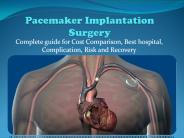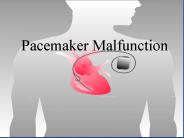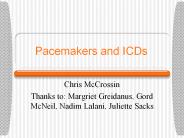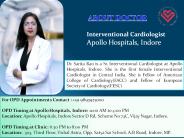Pacemaker Implantation PowerPoint PPT Presentations
All Time
Recommended
Dr Debasis Ghosh is among the most renowned Pacemaker, ICD and CRT implantation doctor who has a number of publications aside his name.
| PowerPoint PPT presentation | free to download
Alpay Celiker M.D. Ac badem University
| PowerPoint PPT presentation | free to download
Pacemaker Implantation Pre-implantation Clinical assessment of patient Age Symptons Underlying cardiac rhythm Underlying medical state Size Evaluation of daily living ...
| PowerPoint PPT presentation | free to view
An electronic device for permanent cardiac pacing. The leads are usually inserted transvenously through the subclavian or cephalic veins with leads positioned in the right atrium for atrial pacing or in the right ventricular apex for ventricular pacing. The leads are connected to the pulse generator, which is implanted in a subcutaneous pocket below the clavicle.
| PowerPoint PPT presentation | free to download
Sri Ramakrishna Hospital in Coimbatore has the most advanced specialist for child heart surgery, child bypass, heart implantation surgical treatment. https://www.sriramakrishnahospital.com/minor-department/paediatric-cardiac-surgery/ Child bypass surgery hospital Coimbatore, Children heart surgery hospital in Coimbatore
| PowerPoint PPT presentation | free to download
A healthy heart has its own pacemaker that regulates at its own pace. but some hearts don't beat often. They usually want a pacemaker device which will correct their draw back. A heart pacemaker implantation can be a small equipment to help the center beat extra often. Pacemakers can facilitate modify heartbeats that square measure too slow, too fast or irregular. It’s a medical device that uses electrical impulses, delivered by electrodes contacting the center muscles, to manage the beating of the center
| PowerPoint PPT presentation | free to download
A pacemaker is a little device that is kept in the chest to help control heart rhythms that are not normal. Pacemaker uses electrical pulses to prompt the heart to beat at a normal rate. For Complete guide for Cost Comparison, Best hospital, Complication, Risk and Recovery click on the link
| PowerPoint PPT presentation | free to download
Copy Link : gooread.fileunlimited.club/pw23/B0CMY82WDN | (PDF) Quick guide for nursing in EP study and pacemaker implantation (Cath Lab nursing) Kindle This book is focused on Electrophysiology (EP) studies and pacemaker implantation from the perspective of a cath lab nurse with a Master's degree. It covers a range of topics including the history of EP studies and pacemaker implantation, indications for procedures, the procedure steps and equipment involved, various types of ablation techniques, patient preparation, nursing management during and after the procedures, potential complications, communication and collaboration, as well as future directions and innovations in the field.The book aims to serve as a comprehensive guide for nurses working in the cath lab, as well as for nursing students interested in this specialized area. It emphasizes the importance of patient-centered care and education, focusing on the role of nurses in ensu
| PowerPoint PPT presentation | free to download
A healthy heart has its own pacemaker that regulates at its own pace. However some hearts do not beat frequently. They typically need a pacemaker device that may correct their downside. A heart pacemaker implantation could be a tiny equipment to assist the center beat additional frequently. Pacemakers will facilitate modify heartbeats that square measure too slow, too quick or irregular. It’s a medical device that uses electrical impulses, delivered by electrodes contacting the center muscles, to manage the beating of the center.
| PowerPoint PPT presentation | free to download
A pacemaker is an electrical device that is used to regulate and normalise the rhythm at which the heart works. The rate at which the heart works and the rhythm at which it works are triggered by electrical impulses generated from within the heart. Abnormalities in these electrical impulses result in arrhythmia, where the heart rhythms are too slow, too fast or irregular.
| PowerPoint PPT presentation | free to download
The cardiac pacemaker market has also faced numerous challenges in terms of increased competition because of rising number of organized and unorganized player in the market thus leading to competition in terms of price and thus negatively affecting the revenue.
| PowerPoint PPT presentation | free to download
... or complex ventricular ectopic activity without sustained VT in absence of long QT syndrome. ... without clear, provocative events and with a hypersensitive ...
| PowerPoint PPT presentation | free to view
Syncope/Dizzy Spells/Palpitations. ? Pacemaker working. ... Patient Presenting With Syncope. S ALLEN 06. Physiological Programming. Rate & Rate Response ...
| PowerPoint PPT presentation | free to view
Q-1. What do you mean by pacemaker? Q-2. What are the types of pacemaker? Q-3. What are the alternate names of pacemaker? Q-4. What are the applications of pacemaker?
| PowerPoint PPT presentation | free to download
Pacemaker Malfunction ECG Signs of Pacemaker Malfunction Failure to output Failure to capture Undersensing Inappropriate pacemaker rate true malfunctions ...
| PowerPoint PPT presentation | free to download
Cardiac Pacemaker System Presented by: Wong Shin Shin (KEU 98038) McCartney Dandot (KEU 97010) Scope of presentation Introduction A prelude: normal heart activity ...
| PowerPoint PPT presentation | free to download
When the heart experiences a cardiac rhythm disturbance, an electrophysiology study (ESP) can be done to locate the source of the irregularity. An ESP is done in an EP lab by a specialist. You will receive an IV and a sedative, then the doctor will insert a catheter that is guided through the blood vessels to the heart chambers. The catheters are attached to a device that measures the electrical impulses inside your heart. Cardiac ablation works by scarring or destroying tissue in your heart that triggers or sustains an abnormal heart rhythm. In some cases, cardiac ablation prevents abnormal electrical signals from entering your heart and, thus, stops the arrhythmia. Cardiac Device Implantation is a term that encompasses pacemakers for bradyarrhythmia treatment, implantable cardioverter defibrillators (ICDs) for tachyarrhythmia management, and cardiac resynchronization therapy (CRT) devices for systolic dysfunction with conduction delays.
| PowerPoint PPT presentation | free to download
Pacemakers and ICDs Chris McCrossin Thanks to: Margriet Greidanus, Gord McNeil, Nadim Lalani, Juliette Sacks * * * * Means the pacer is just beating at the rate you ...
| PowerPoint PPT presentation | free to download
Pacemaker is defined as a small, battery-operated medical device, which is implanted in the chest to control the heartbeats. The implantation of pacemaker is used to prevent the heart from slow or irregular beating. It generates electrical impulses, which are delivered by electrodes to contract chambers of heart muscles. The pacemaker aims to regulate the function of the electrical conduction system of the heart. The pacemaker is implanted in the chest through a surgical procedure. It is used for the treatment of chronic irregular, or slow heartbeat, and heart failure. It offers real opportunities to improve medical outcomes and enhance efficiency.
| PowerPoint PPT presentation | free to download
Read here the latest updates on the Cardiac Pacemaker Market Analysis published by CMI team
| PowerPoint PPT presentation | free to view
Medicare covers leadless pacemakers through CED, which means CMS will provide coverage for leadless pacemakers when procedures are performed.
| PowerPoint PPT presentation | free to download
The pacemaker market is estimated to achieve USD 5.1 billion by 2024 from USD 4.3 billion in 2017, at a CAGR of 2.1%. Pacemakers are medical devices that regulate the rate at which the heart’s chambers pump blood and are meant for persons who suffer irregular heartbeats. This can be caused by several variables, including environmental, genetic, and behavioural factors, or a combination of them. Pacemakers are linked to longer lifespans and life expectancies in persons who have them implanted. On the other hand, electronic pacemakers are related to several issues, including their size. Even though current units can be as little as a grain of rice, some users find them difficult to wear. For the complete in-depth article on ‘Battery-Free Implantable Pacemakers’, please visit @ https://www.iebrain.com/next-generation-battery-free-implantable-pacemakers/
| PowerPoint PPT presentation | free to download
... Fires ventricles Atrial Fires atria Atria fire ventricles Requires intact AV conduction Cardiac Pacemakers Demand Pacemaker Types Atrial Synchronous Senses ...
| PowerPoint PPT presentation | free to download
Contact- 03340585544 Email- info@medithics.com
| PowerPoint PPT presentation | free to download
The global pacemaker market is likely to post a CAGR of 6.5% over the forecast period of 2018-2023, asserts Market Research Future (MRFR) in an exclusive study.
| PowerPoint PPT presentation | free to download
CARE OF PATIENT ON PACEMAKER WHAT IS A PACEMAKER? - A cardiac pacemaker is an electronic device that delivers direct stimulation of the heart What is the purpose of a ...
| PowerPoint PPT presentation | free to download
The global cardiac pacemakers market is expected to grow from $4.03 billion in 2021 to $4.26 billion in 2022 at a compound annual growth rate (CAGR) of 5.63%.
| PowerPoint PPT presentation | free to download
Global cardiac pacemakers market size is expected at $5.28 Bn by 2027 at a growth rate of 4.0% and growth analysis by The Business Research Company.
| PowerPoint PPT presentation | free to download
A Pacemaker For Your Brain By: Ryan Buckley What is a Pacemaker For The Brain? Similar to a heart pacemakers Implanted in chest Electrical stimulation to maintain ...
| PowerPoint PPT presentation | free to download
Pacemakers and Implantable Cardioverter Defibrillators Dr. Sivaraman Yegya-Raman Typical Case 58 year old male, CAD, prior MI, EF 28%, CHF, NYHA class II ...
| PowerPoint PPT presentation | free to view
Pacemakers and Internal Cardiac Defibrillators Mark Wahba Resident Rounds September 11, 2003 See: Brady s, Blocks, & Pacers Moritz Haager 1 hr rounds July 17, 2002 ...
| PowerPoint PPT presentation | free to view
Pathophysiology. AV node hypoxia/ischemia. Myocardial infarction. Increased vagal or decreased sympathetic tone. AV Blocks. Complete ...
| PowerPoint PPT presentation | free to view
Deep Brain Stimulation: Brain Pacemakers Kaitlin Abbate What is Deep Brain Stimulation (DBS)? Surgical treatment involving placement of brain pacemaker into the brain ...
| PowerPoint PPT presentation | free to download
According to The Insight Partners market research study titled ‘Pacemakers Market - Global Analysis and Forecasts by Product Type, Technology and End User. The global pacemakers market is expected to reach US$ 10,908.0 Mn in 2027 from US$ 5,485.4 in 2018. The market is estimated to grow with a CAGR of 8.1% from 2019-2027. The report highlights the trends prevalent in the global pacemakers market and the factors driving the market along with those that act as deterrents to its growth.
| PowerPoint PPT presentation | free to download
Global cardiac pacemakers market size is expected to reach 6.14 Bn by 2028 at a rate of 6.1% segmented as implantable, external
| PowerPoint PPT presentation | free to download
Sri Ramakrishna Hospital in Coimbatore has the most advanced specialist for child heart surgery, child bypass, heart implantation surgical treatment.
| PowerPoint PPT presentation | free to download
This report studies the global market size of Implantable Heart Pacemaker in key regions like North America, Europe, Asia Pacific, Central & South America and Middle East & Africa, focuses on the consumption of Implantable Heart Pacemaker in these regions.
| PowerPoint PPT presentation | free to download
The Pacemakers in healthcare market was valued at US$ 5,485.4 million in 2018 and it is projected to reach US$ 10,908.0 million by 2027; it is expected to grow at a CAGR of 8.1% from 2019 to 2027.
| PowerPoint PPT presentation | free to download
The Pacemakers in healthcare market was valued at US$ 5,485.4 million in 2018 and it is projected to reach US$ 10,908.0 million by 2027; it is expected to grow at a CAGR of 8.1% from 2019 to 2027.
| PowerPoint PPT presentation | free to download
The Global Implantable Pacemaker Industry report firstly introduced the Implantable Pacemaker basics: definitions, classifications, applications and industry chain overview; industry policies and plans; product specifications; manufacturing processes; cost structures and so on.
| PowerPoint PPT presentation | free to download
The Business Research Company’s report, “Global MRI Compatible Pacemakers Market Prospect To 2019 - Inviolable Need and Rapidly Growing Awareness of MRI to Drive the Market” provides insights, trends, data and analysis on the global MRI Compatible Pacemaker market. For more details : http://goo.gl/PxoBWH
| PowerPoint PPT presentation | free to download
The Cardiac Pacemakers Market accounted to USD 5.2 billion in 2016 growing at a CAGR of 10.5% during the forecast period of 2017 to 2024.
| PowerPoint PPT presentation | free to download
Role of Pacemakers and ICDs in AF Diagnosis and Management Ian Wright Principal Cardiac Physiologist Imperial College Healthcare NHS Trust Cardiac Rhythm Management ...
| PowerPoint PPT presentation | free to view
Global Cardiac Pacemaker Market size is expected to reach $4.8 billion by 2023, rising at a market growth of 3.9% CAGR during the forecast period. Full report: https://kbvresearch.com/cardiac-pacemaker-market/
| PowerPoint PPT presentation | free to download
“Cardiac Pacemaker Market: Global Industry Analysis and Forecast, 2016–2024”. The global cardiac pacemaker market was valued at US$ 4,100.0 Mn in 2015 and this is likely to decline to US$ 3923.8 Mn by 2024.
| PowerPoint PPT presentation | free to download
Figure 13.13 An artificial ... of the electronic control system for a fluid or drug delivery pump Figure 13.18 A block diagram of an implantable artificial pancreas ...
| PowerPoint PPT presentation | free to view
The global pacemakers market was valued at USD 3,863.4 million in 2018 and is expected to grow at a CAGR of 2.5% over the forecast period.
| PowerPoint PPT presentation | free to download
Global Pacemaker Market Research Report: Information by Implantability (Implantable Pacemakers and External Pacemaker), Technology (Dual-Chamber Pacemakers, Single-Chamber Pacemakers and Biventricular/CRT Pacemakers), Type (MRI Compatible Pacemakers and Conventional Pacemakers), End User (Hospitals & Cardiac Centers and Ambulatory Surgical Centers) and Region (Americas, Europe, Asia-Pacific and Middle East & Africa) - Forecast till 2025
| PowerPoint PPT presentation | free to download
Sri Ramakrishna Hospital in Coimbatore has the most advanced specialist for child heart surgery, child bypass, heart implantation surgical treatment. https://www.sriramakrishnahospital.com/minor-department/paediatric-cardiac-surgery/ Child bypass surgery hospital Coimbatore, Pediatric pacemaker implantation surgery Coimbatore
| PowerPoint PPT presentation | free to download
Defibrillator in Acute Myocardial Infarction Trial. Enrolled patients within 40 days of acute MI to optimized medical therapy either ...
| PowerPoint PPT presentation | free to view
Northwestern University, Feinberg School of Medicine ... Goteburg Metoprolol Trial. p value. Mortality % Treatment. Age. Follow-up. Study ...
| PowerPoint PPT presentation | free to view
Dr. Sarita Rao is one of the best cardiologists in Indore and she provides best treatment for Angiography, Angioplasty, TAVI, Pacemaker, Rotablation, Stent Implantation, AICD Implantation, Combo Device Implantation and Shockwave Lithotripsy IVL. If you are looking for the best heart specialist in Indore, so visit at their clinic. Call now for +91 9893925000 appointment and online visit our website https://drsaritaraocardiologist.com/
| PowerPoint PPT presentation | free to download
Dr. Sarita Rao is the best Cardiologist in MP and she provides treatment of Angiography, Angioplasty, TAVI, Pacemaker, Rotablation, Stent Implantation, AICD Implantation, Combo Device Implantation and Shockwave Lithotripsy IVL at her clinic in Indore. If you are looking Top Cardiologist in Indore for Angioplasty then visit Dr. Sarita Rao's Clinic Hridayam Heart Care Center. Call now for an appointment at 9893925000 or online visit for more information - https://drsaritaraocardiologist.com/
| PowerPoint PPT presentation | free to download
... coil, St. Jude SPLTM cardioverter defibrillator lead (Model # SP-01, St. Jude ... lethal and non-lethal weapons by law enforcement personnel internationally ...
| PowerPoint PPT presentation | free to view
Dr. Siddhant Jain, DM Cardiology is a Senior Interventional and Consultant Cardiologist with a rich experience of more than 15 years of patient service, who treats Heart-related problems which include, Angioplasty, Angiography, Pacemaker implantation, and Bypass Surgery. For more details visit these links:- https://www.cardiologistindore.com/dr-siddhant-jain-my-introduction/
| PowerPoint PPT presentation | free to download
Cardiothoracic surgery is a major operation that surgery can lead to various complications, including bleeding, infection, arrhythmia, pneumonia, stroke, and kidney failure. Bleeding can cause low blood pressure, shock, anaemia, or stroke. While infection can cause fever, pain, swelling, redness, pus, or wound breakdown. Arrhythmia affects the heart rhythm and as per Dr. Ranjit jagtap clinic some possible recourse available are medication, electrical shock, or pacemaker implantation which can relieve symptoms. Pneumonia affects the lungs and may require antibiotics, oxygen therapy, or mechanical ventilation.
| PowerPoint PPT presentation | free to download








![[PDF] Quick guide for nursing in EP study and pacemaker implantation (Cath Lab nursing) Ipad PowerPoint PPT Presentation](https://s3.amazonaws.com/images.powershow.com/10094241.th0.jpg)















































